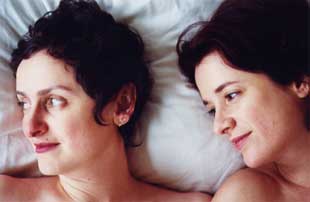

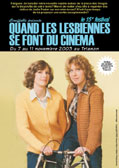 The Cineffable Lesbian Film Festival celebrates its 15th year anniversary this year and on the occasion of this remarkable longevity for a volunteer run fest, the Paris local government saw fit to give the event 15,000 Euros. Perhaps the gay socialist mayor saw the need for the festival, a woman's only extravaganza, and it was duly rewarded, long overdue.
The Cineffable Lesbian Film Festival celebrates its 15th year anniversary this year and on the occasion of this remarkable longevity for a volunteer run fest, the Paris local government saw fit to give the event 15,000 Euros. Perhaps the gay socialist mayor saw the need for the festival, a woman's only extravaganza, and it was duly rewarded, long overdue.
Fifteen years of festivals involve an annual selection process of films that chronicle the times. The films submitted usually indicate current themes women are making movies about. As in previous festivals the selection committee wants to showcase 'diversity'. This "diversity" though sometimes involves films which the public find problematic for the representation of lesbian women-- such as films representing female pornography and 'queer' topics. However, the politics of film finance and distribution seems to be an area that is invisible in a field where capital intensive projects dictate what's being sent, and what's being seen.
From 300 films, 83 were selected, representing 19 countries. Let's have a closer look at the breakdown. There are 19 countries represented for sure, but a staggering 49 films come from Anglo-American countries: USA (24) UK (11), Canada (8) and Australia (6). Many of these films received significant financing. Its all in the credits at the end, the 'visible evidence' which everyone seems to walk out on. In this fine print can be noted how films receive financing such as from university film programs, state film commissions, arts councils, private financing, and endorsements from directors and film foundations.
France accounts for nine of the films this year, (including two USA/French co- productions). Fourteen countries follow: Italy with two, and with one each: Greece, Albania, Brazil, Chile, Mexico Finland, Sweden Hungary, Belgium, The Netherlands, South Africa, South Korea and China.
At the 1998 festival, the Cineffable volunteers claimed they were interested in films from other countries, but were inundated by work from the USA. In the 1999 festival they admitted that the bulk of the films were still mostly 'Anglo Saxon'. At the same time there was a full page ad in the catalogue on a French experimental film group that distributed their own work. This year there were around 12 experimental films. Shorts help to acquire future feature film work and have to have a high technical quality. This year two filmmakers had Spike LEE alliances, Kali ( Shari Carpenter, Spike's editor and D.E.B.S ( Angela Robinson, Spike's assistant)--- two of the more problematic films this year from the USA, one in terms of themes, and the other in terms of production. Technically polished films do not necessarily have better messages, in fact money can dillute the message and scare the sponsors.
The slick D.E.B.S. (Angela Robinson, 2002 USA ) has several key positions 'manned' by crew with names like Greg, Lindsay and John. The film buys into every convention in the book: girls in school uniforms, assassin squads and dorky dames. Far more distressing is the obligatory 'Warning' from the Hollywood genre assembly lines. 'Beware: Chicks with Guns' ( echoing Godard: "all you need is a girl and a gun"). Female paramilitary crews in school uniforms are engineered by Greg Jim and Lindsay who in turn orchestrate an erotic kiss between two women before their next assignment in Uganda.

Spike Lee's films are not always favorable to women but neither is Kali's Vibe (Shari Carpenter, USA, 2002) favorable to lesbians, a film involving a bad relationship between two women in the throes of sex and love addiction as well as drugs. But then Kali is 'just Kali', and a man at the office who wears her down till she finally says yes winds up the love of her life, and prospect for a long term commitment

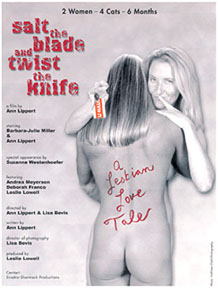
Salt the Blade and Twist the Knife : a Lesbian Love Tale
, ( Anne Lippert USA 2001) was produced by "Powerup : Professional Organization Of Woman in Entertainment Reaching Up") : a comical film about looking for Ms Right with guest appearance by Suzanne Westerhoefer. Ruthie and Connie: Every Room in the House ( Deborah Dickson, USA 2002) is a documentary on two women living with Ms Right.While it can be said that lesbian films are 'technically better' than the old grainy outdoor 70's films of Barbara Hammer with latex gloves even the 'Mother of All of Us' has received many prestigious awards and is back this year with History Lessons, (2002, USA) found footage from archives such as women in the US armed forces, with Hammer's 'play with the images' signature.
While humorous, the aesthetic of a LA singles club for lesbians may seem fun but it is silly how a woman arriving to the club with air fanned hair and larger than life face is reified. (The Ten Rules: a Lesbian Survival Guide--Lee Friedlander, 2002, USA).

Rejuvenating it was to see Belgian lesbians doctor ads of supermodels such as Claudia Schiffer in What are We Doing Tonite (Marie Vermeiren, Belgium 2002) , rewriting their own messages: 'Vulgar Model, Macho Ad, 'Je Gerbe' (I puke) with a creative grainy doc style.
The secrets of mermaids breeding (How Mermaids Breed--Joan Ashworth, UK 2002) is clearly made by someone who never heard of parthenogenesis, which is why the sperm sucking machine made the audience whistle in rebuke. Film won in the experimental category which usually features the cinefabulous French veteran Laurence Rebouillon, this time with poetic 'politique' on the influx of National Front in the French presidential election of 2002 -- Ciao Bella Ciao, France 2002).

The Albanian documentary from Germany Pashke and Sofia (Karin Michalski, 2003, Germany) illustrates a situation of interest to lesbians or transgenders today and certainly reveals living mythology in a European country. The harsh ritual of country once controlled by the former Soviet Union is as far from the 'ten rules for Lesbians' as can be --dog years. Old films from the Soviet occupation accentuate the rituals. Also noteworthy is the first French documentary on children with same sex parents: Nos Parents sont Gays et c'est pas triste( Marie Mandy, France 2003).

Questions from children to transgenders unequivocally illustrate its still Uncle Bill inside although Aunt Barbara gets a pass (No Dumb Questions, Melissa Regan, USA 2001). The photography has a handheld freshness although one of the kids asked the camera be turned off at one point which never was.
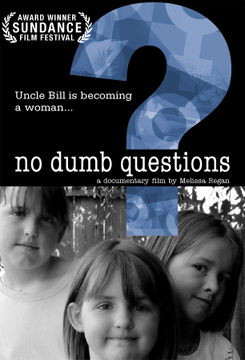
Several promising discussions that grace the festival put the politics into the swing of things by raising the question of lesbian invisibility. No, San Franciscan Madigan does not use the word lesbian (nor does 'just Kali') but the English subtitles do in a film on her trip to France ( Angel Food Harper Carter, USA/FRANCE , 2003) with cello and grunge voice fifty degrees below zero from Allison Morrisette. Doc is rather uneventful at times until Madigan makes the astute observation that two fish in a tank would fare well in the sea. The ghetto goes global; at least that is how she sees women's events evolving today. "Why would you think I would want to play for women only?" she asks women in the Paris group "Barbares". "It's not about struggle", they reply, "nor about marginalizing identity politics --its about strategy". Madigan is all for coalitions, wider schools of fish, and since her driver finds her interesting she's concerned he wouldn't be able to hear her in the 'ghetto'. Power-up Madigan! The ripples of the sea where mermaids breed in Madigan's world aspire to other realms. (Madigan is after all another sign of the time.)

Albanian virgins living as men, and 'fish and elephants' from China are voices of diversity that seem profound in comparison to grunge and 'powerups'. Fish and Elephant (Jian Nian Xia Tian, by Li Yu, China 2001) is actually the first film from mainland China to treat lesbian relationships and was shown at the Venice 2001 International Film Festival. The low budget film is a powerful document on a relationship between a zoo keeper and shop owner--a bond they must keep secret.
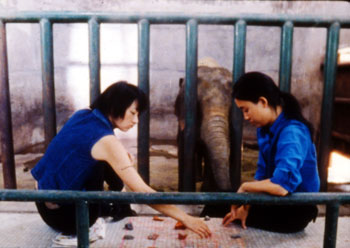
Films involving explicit sex are standard fare at Cineffable. The Born Queer Dear Doctors (Shorona Se Mbessakwini, Australia 2002) black and white cinematography is crystal clear, but the voice is hollow in this intersex, experimental, spoken-word, porn, video-art piece. The aesthetic images of bodies and genitalia make the group sex displayed a powerful worship of libido, a mourning of lost folds. Making love to an inflatable rubber doll with a dildo The Secret Life of Dafna Ganani (UK) is not new and an icon of 'tragique' lesbian tales of the 1960's such as The Killing of Sister George. However boygirls looking for girly cowgirls do no harm in Pretty Ladies a Super 8 Explosion (Catherine Crouch, 2002, USA).

Nor does Dana McLeod's latest flic that shifts irony to A BIG STATEMENT: stop intellectualizing about porn, have more sex. And sex it is in bathtubs, on trains, on school staircases in bathroom stalls, and the point is? The ideas of the field of women's studies-- a threatened academic field -- in Womyn's Studies: Lessons in Porn (Canada, 2002) are trivialized beyond recognition as writhing flesh stirs in the emptiness of her script. Stimulus = response. Which goes to say that for McLeod , words and ideas aren't very erotic.

The end tune at the Cineffable awards ceremony says something about the French festival this year and more and more every year: the English language tune "It's Our World". Yes, 49 films from Anglo American women were the Cineffable world for the 15th edition. Young French women under 25 are fluent in English compared with older generations who insist on French being spoken in France. (Could that coincide with the fact that the average age of the movie going --that is US movie going --public is under the age of 30?). By choosing nostalgic docs for the older crowd such as The Edge of Each Other's Battles, the Vision of Audre Lorde, (Jennifer Abod, 2002 USA) a 1990 conference for the beloved poet stricken with cancer, its possible to marvel at the virtual 'strength' in identity politics beyond getting a girl a gun and a dildo. Abod by the way has a doctorate in women's studies and media.

Radical Harmonies
(Dee Mosbacher, 2002, USA) shows how women's music was so much part of women's culture (yep, Madigan) and created community. Older French lesbians swayed to Cris Williamson's "Changer and the Changed". Mcleod equates this background with feather ticklers and Grecian urns. Whose world? - Our World! Evolving, synthesising. But to echo the words of the confused protagonist who winds up in bed with men to sort it all out as a lesbian (as does 'Kali') in the best feature Do I love You. (Lisa Gornick 2002 UK) "I felt like a pre-feminist" looking at some of the images of women at Cineffable in the 15th edition, wondering how to make sense of it and feeling the divide of capital rather than 'the warmth surrounding me'.Cineffable 2003 Awards
The People's Awards: two films from France, USA and the UK.
People's Prizes: